Social protection in the Pacific within grasp
Pacific households will not recover from the health, economic, and educational impacts of COVID-19 based on grit and resilience alone. Data shows that traditional community assistance mechanisms are being pushed to their limits as Pacific families cut costs to recover from the pandemic while also grappling with inflation and the impacts of climate change[1].
Small-scale initiatives in the Pacific have generated evidence that cash and voucher assistance is fast, effective, and reliable. In countries without a formal safety net, these payments have given families in crisis the flexibility to help themselves in a dignified way.
If we are to ensure that the region’s hard-won development gains of the past decades are not reversed, donors must integrate learnings from cash trials to invest in permanent social protection systems that help Pacific families recover from the pandemic and build resilience for future crises.
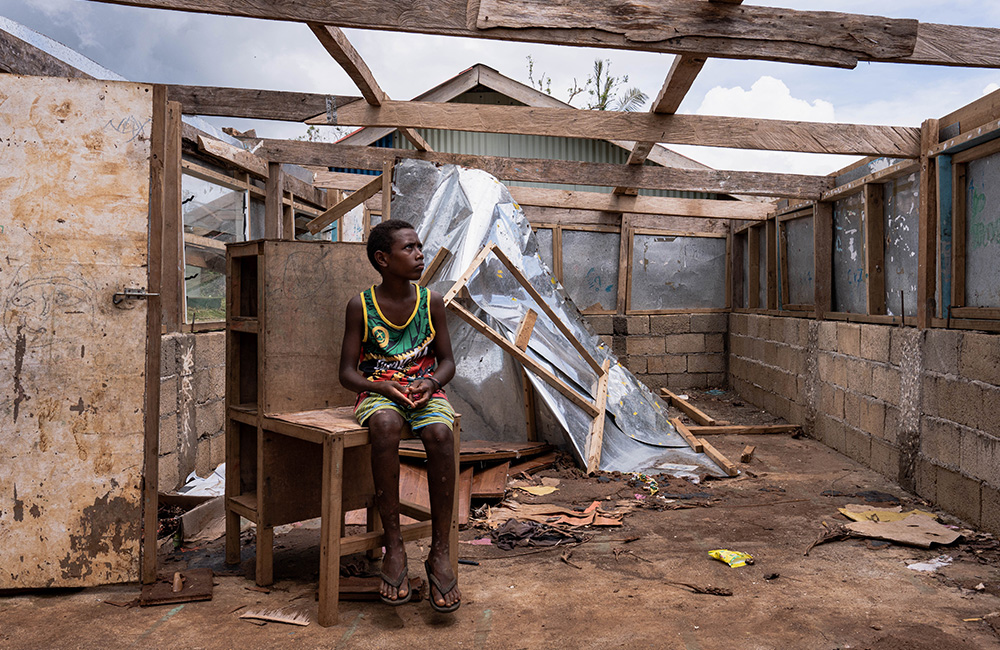
Noa* (11) from Vanuatu sits in his damaged school after two back-to-back cyclones in March 2023.
Photo: Damian Mobbs / Save the Children Vanuatu.
Crises are compounding post-pandemic
The impacts of COVID-19 on the Pacific Island Countries (PICs) remain serious despite the resumption of tourism and recovery in the minerals sector. The Asian Development Bank (ADB) expects that this nascent recovery will continue, albeit at a moderate pace, projecting average growth at 3.3% across the Pacific in 2023 and 2.8% in 2024 [2].
Inflation remains forecast to rise steeply in the region, with the ADB projecting 5% in 2023, for reasons ranging from the war in Ukraine to a slowdown in China and monetary tightening in the United States [3]. According to UN data, rates of severe food insecurity have sharply increased in the Pacific and worldwide.
The number of severely food insecure people rising to as many as 828 million in 2021 – an increase of about 46 million since 2020 and 150 million since the outbreak of COVID-19 [4].
In addition to inflation, climate change impacts are also worsening across the PICs, compounding food stress by reducing, for example, the amount of arable land available. This impact cannot be taken lightly – households with diminished incomes often rely on subsistence farming to feed their families. Access to smallholdings also underpins customary mutual help traditions, which have been reinvigorated during the pandemic as access to cash has dried up.
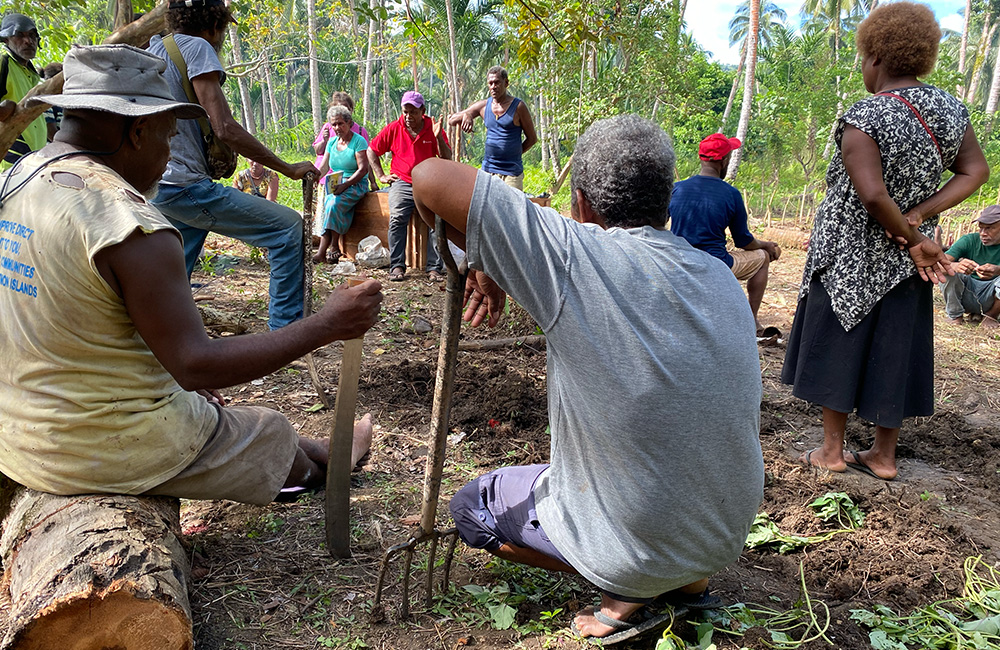
Access to arable land is critical to fight food insecurity as inflation ramps up in the Pacific.
Photo: Katharina Glynne / Save the Children Australia.
Safety net critical for children
Across the 12 PICs, only 1.3% of children or their households receive child or family cash benefits. Fiji is the only one of these countries with a cash transfer program specifically for children and their families [5].
PNG, the Solomon Islands and Vanuatu all lack social protection systems. Without them, governments of these three PICs were unable to deliver widespread cash transfers during the pandemic to alleviate household pressures and mitigate the need for coping mechanisms that compromise children’s nutrition and education. For its part, Fiji’s system is modest in its coverage.
These conditions raise serious concerns about Pacific children’s already poor nutritional and educational outcomes. According to UNICEF, more than 22 million children were undernourished across East Asia and the Pacific before COVID-19 and the twin impacts of the pandemic and inflation have only made things worse [6].
In a region where child undernutrition remains a significant problem – Timor Leste and PNG have the second and third-highest stunting rates worldwide – the impact on children is likely devastating and lifelong [7].
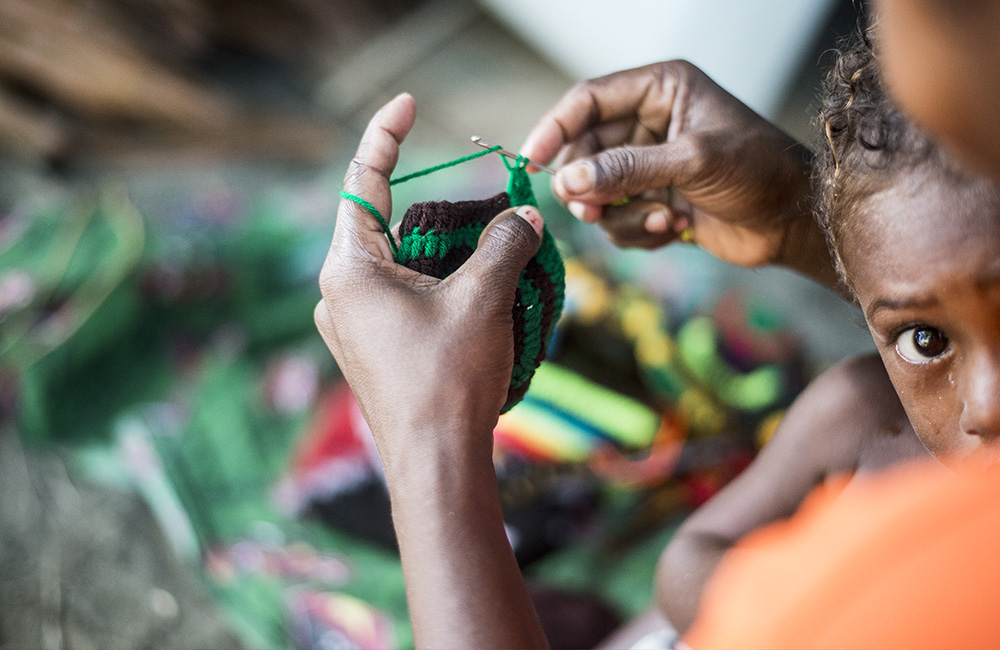
Child-centred social protection systems are critical in ensuring Pacific families are strong and children grow up healthy and well. Photo: Robert McKechnie / Save the Children Australia.
We must build adaptive, shock-responsive social protection systems that can not only help Pacific families rebuild post-pandemic but expand rapidly to deliver income support during future crises.
Social protection trials ready for scale
Donor assistance will be key. Given the Australian Government’s commitment to social protection, Australia should take the lead in assisting PNG, Solomon Islands and Vanuatu to build this critical infrastructure. Plans to support PNG’s introduction of a new child and maternity benefit are a welcome beginning [8].
Investment at such a significant scale must be underpinned by evidence and proof of concept trials.
Save the Children has already supported more than 30,022 people weather financial shocks through cash and voucher assistance trials in Vanuatu, Solomon Islands, Fiji and Papua New Guinea between 2017 and 2022. With funding from Disaster READY under the Australian Humanitarian Partnership, Cash and Voucher delivery mechanisms were built and tested and the capacity of government and sector peers to deliver it strengthened.
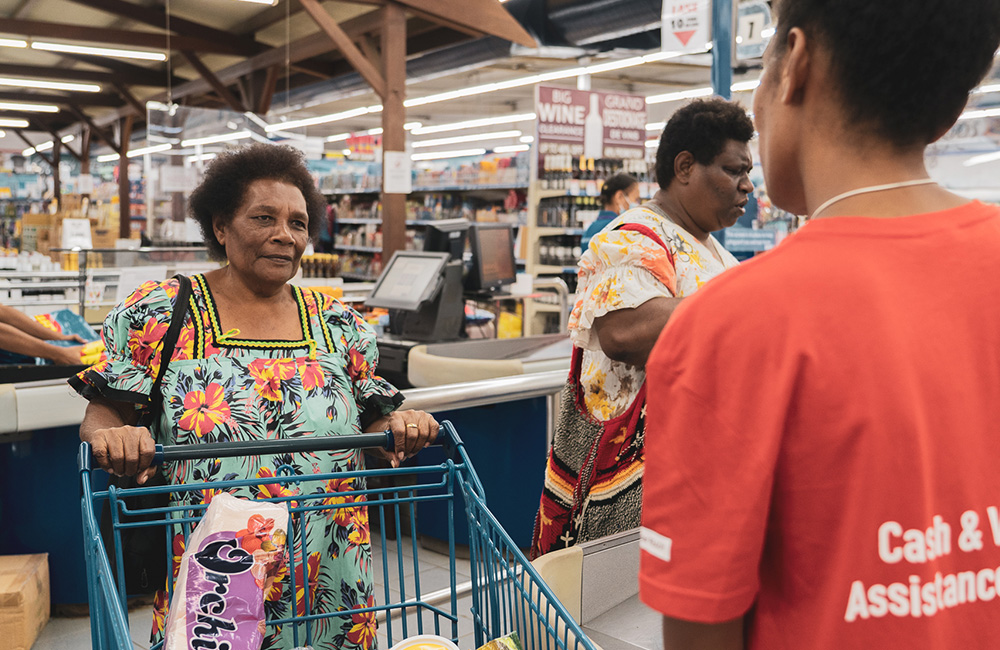
A woman from Vanuatu buys groceries after receiving Cash and Voucher assistance during a 2022 cash trial.
Photo: Markson Taiki / Save the Children Vanuatu.
In Fiji, these foundations allowed Save the Children to scale up and deliver the biggest cash transfer project ever implemented by a civil society organisation in the Pacific. The project was worth over $20 million USD and used mobile money technology to distribute cash to over 39,000 families financially impacted by the downturn caused by the pandemic.
An external evaluation suggests 94% of families spent part of their payments on food and 20.6% on their children’s education [9]. The cash readiness of partners and Government increased significantly, and Fiji has since adopted the same mobile money technology for more rapid distribution of its regular social protection payments.
An investment in the next generation
Based on this evidence, Save the Children recommends an initial investment of $77.3 million over three years to catalyse the development of Pacific social protection systems where they don’t exist.
This investment should build on the system-level work undertaken by the Australian Government-funded Partnerships for Social Protection (P4SP). It should be aimed at instituting pilot projects in three sub-national government areas in three PICs - namely Western Province in PNG, Malaita Province in the Solomon Islands, and Sanma Province in Vanuatu.
The systems must be built to make payments aimed at assisting children by providing income support that alleviates the costs of raising them, such as purchasing appropriate and nutritious food and educational supplies. We also recommend a special focus on people with disabilities, who bear additional living costs for reasonable accommodations and services, and whose capacity to participate in meaningful employment is more precarious.
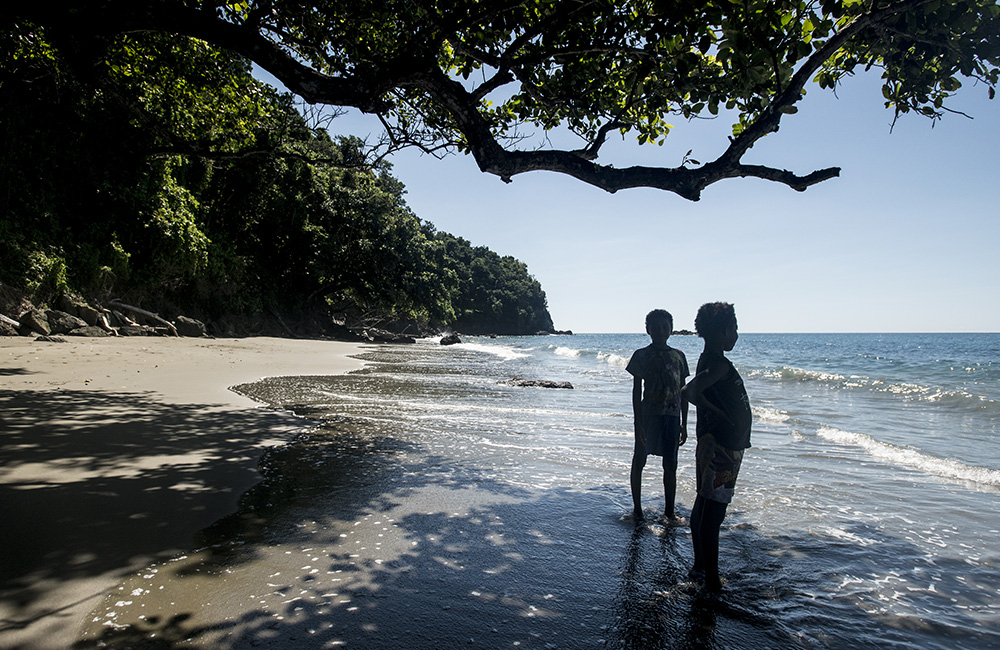
Social protection systems can complement traditional mutual help customs based on reciprocity in the Pacific.
Photo: Rob McKechnie / Save the Children.
Such initiatives would further develop national capacity for ongoing social protection delivery, as well as generating evidence about the impact of child-sensitive social protection on positive human capital outcomes. Further, they could contribute to building support for the introduction of long-term, national-level investments in the lives, rights, and futures of Pacific children.
We note that DFAT has successfully led similar pilot programs in the past via its MAHKOTA (Towards a Strong and Prosperous Indonesian Society) and KOMPAK (Governance for Growth) programs in Indonesia.
The latter initiative was implemented in Papua Province, which shares many characteristics with regional areas in the PICs discussed above, including underdeveloped facilities for service delivery and remoteness from national systems and structures. Despite these challenges, the BANGGA Papua program implemented an inclusive child grant for all Papuan children under the age of four in 2018 [10].
Such successes must be learned from and urgently replicated so the next generation of Pacific children has adequate nutrition and education, a lifelong foundation for success.
More than money
Successful social protection schemes will link Pacific households to critical education, nutrition, protection, and other services in line with a proven ‘cash-plus’ approach.
While cash and voucher assistance can help Pacific families meet their basic needs in a dignified way, they are not a ‘silver bullet’ for alleviating all aspects of poverty. There is compelling evidence that cash transfers can achieve significantly greater impacts on child outcomes when combined with complementary interventions and other services [11].
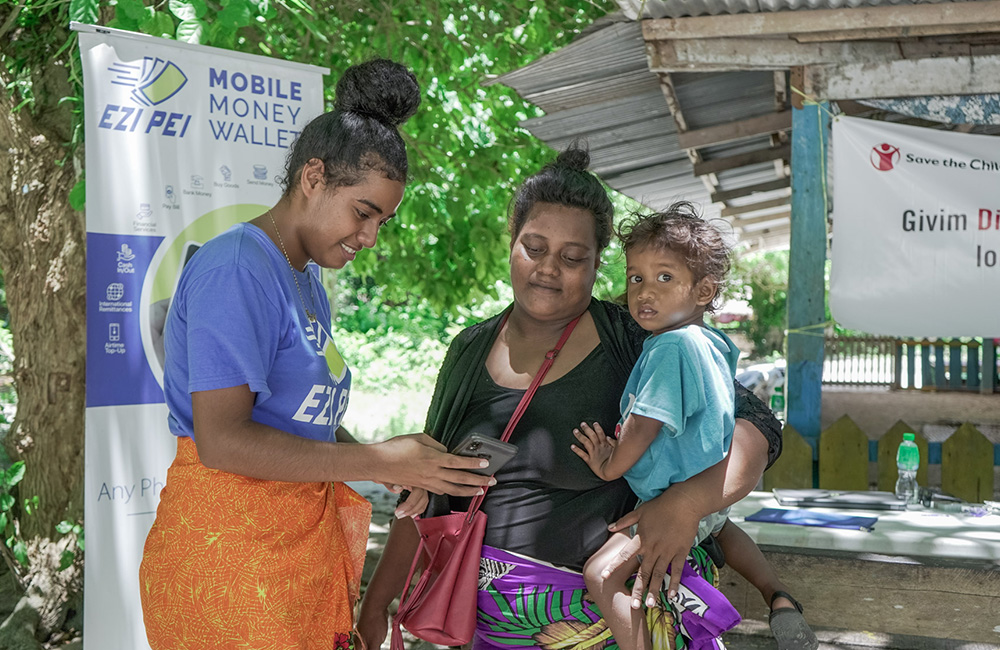
Aggy and her son Lonsdale from Solomon Islands register for an EziPei account to receive support from Save the Children’s cash and voucher initiative.
Photo: Collin Leafasia / Save the Children Australia.
For example, while a cash payment used to pay school fees or purchase stationery may improve school enrolment and attendance, additional support would be required to challenge cultural norms relating to child marriage and the role of girls in the home.
If cash transfers are to achieve maximum benefit for children, they will need to be designed and implemented in a way that addresses the multiple barriers preventing progress from being achieved.
Underpinned by the evidence
With the impacts of the pandemic, climate change and inflationary conditions weighing heavily on PICs, Australia must integrate learnings from small-scale cash trials to develop sophisticated, sustainable social protection systems across the Pacific.
Critically, this work will need to produce evidence that assesses the social and financial return on investment long-term, including by exploring the multiplier effect on local economies. Governments will demand this evidence to justify the significant investment required to build long-term systems and distribute payments during crises.
We must depart from instituting one-off, small-scale projects in response to humanitarian crises and work with partners to develop a permanent, networked, Pacific-wide system that is fit for the future and supports Pacific children to thrive.